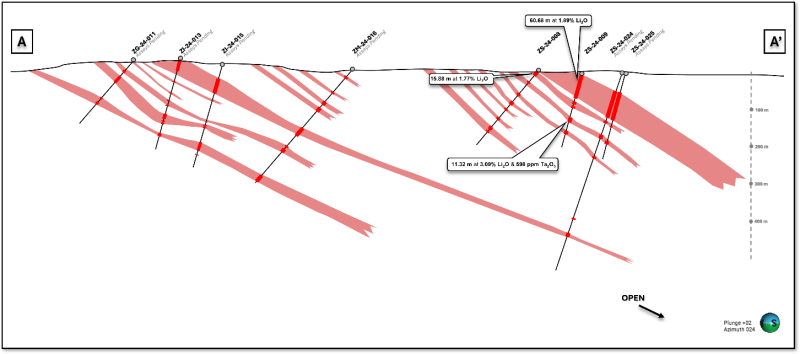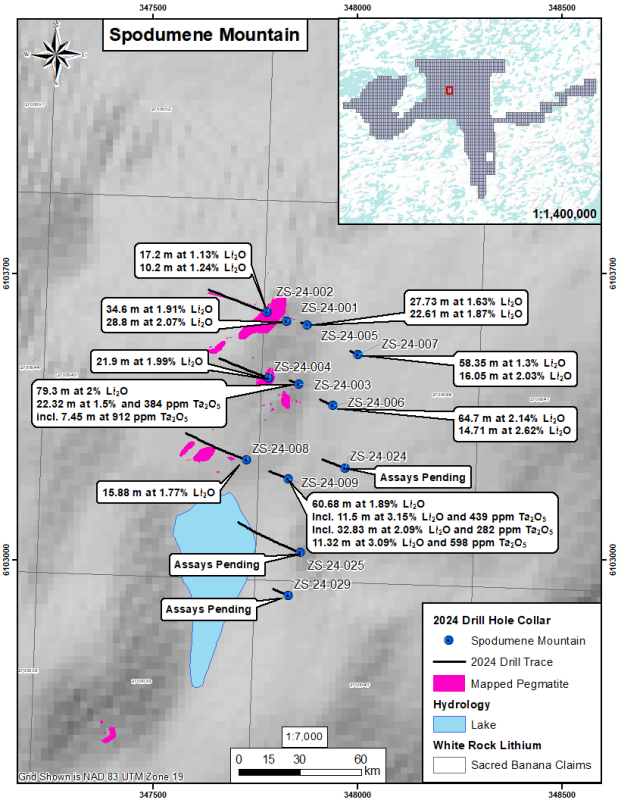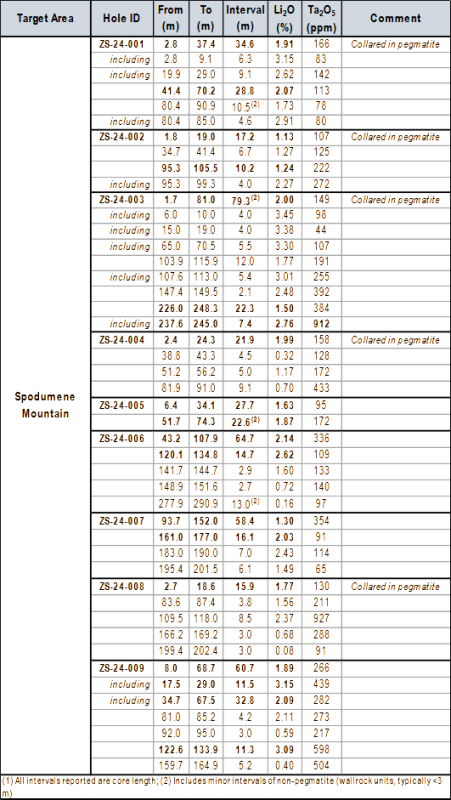WhiteRock Lithium Drills 79.3 m at 2.00% Li2O from Surface and Concludes the 2024 Summer Campaign
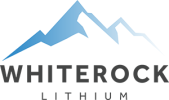 | |||||||||
 |  | ||||||||
Highlights:
-
Discovery of three new pegmatite clusters during local mapping campaign, extending the area of know pegmatite occurrences to 2.4 km x 1.5 km and remains open in all directions.
-
Core sample assay highlights from the first nine (9) drill holes of the 2024 campaign targeted the Spodumene Mountain:
Spodumene Mountain:
◦ 79.3 m of 2.00% Li2O and 134 ppm Ta2O5 (ZS-24-003), including,
▪ 4.0 m of 3.45% Li2O and 98 ppm Ta2O5, and,
▪ 4.0 m of 3.38% Li2O and 44 ppm Ta2O5, and,
▪ 5.5 m of 3.30% Li2O and 107 ppm Ta2O5
◦ 64.7 m of 2.14% Li2O and 336 ppm Ta2O5 (ZS-24-006), and,
◦ 14.7 m of 2.62% Li2O and 266 ppm Ta2O5 (ZS-24-006)
◦ 60.7 m of 1.89% Li2O and 336 ppm Ta2O5 (ZS-24-009), including,
▪ 11.5 m of 3.15% Li2O and 439 ppm Ta2O5, and,
▪ 32.8 m of 2.09% Li2O and 282 ppm Ta2O5
◦ 11.3 m of 3.09% Li2O and 598 ppm Ta2O5 (ZS-24-009)
-
2024 drill campaign concluded totalling twenty-nine (29) NQ-size drill holes, for approximately 7870 m
November 5, 2024 – TheNewswire – WhiteRock Lithium. (the “Company” or “Whiterock”) is pleased to announce completion of the 2024 field program and discovery of three (3) new spodumene pegmatite clusters at the Sacred Banana Property (the “Property” or the “Sacred Banana”) located in Quebec, Canada. Together with geological information collected from the inaugural drill campaign the area of know pegmatite occurrences is now extended to 2.4 km x 1.5 km and remains open in all directions. Surface sampling, logging and initial core assays result of nine (9) drill holes confirm the continuity of spodumene mineralization in shallow dipping, near surface pegmatite lobes.
Dustin Nanos President and CEO comments. "The first core sample assays of our summer program have confirmed a very significant, sizeable high-grade lithium discovery at Spodumene Mountain, and have exceeded our most optimistic expectations. The extent of lithium mineralization at Spodumene Mountain is spectacular and remains open along strike and down dip. We look forward to the remaining results from our summer drill campaign as we continue to realize the potential of this discovery."
The 2024 summer-fall mapping and drilling campaign has concluded, whereby three (3) additional zones of spodumene-bearing pegmatite occurrences have been discovered (Figure 1). Roloh located approximately 650 m northwest of the previously known Isabella pegmatites expands the potential of further lithium-cesium-tantalum (LCT) pegmatites to the north. The Marine Extension pegmatites extend over 400 m and were discovered in an east of the Marine pegmatite cluster. The third pegmatite cluster Michael is approximately 300 m south of Spodumene Mountain. Assays of new channel samples were collected and assays are pending.
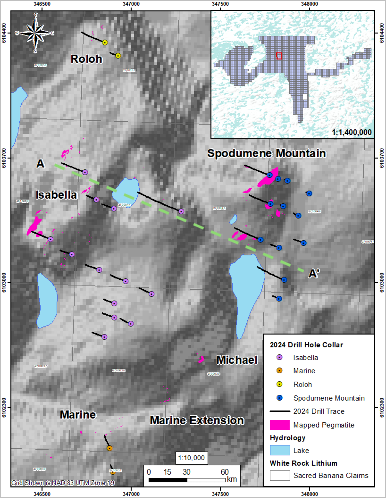
Figure 1: Map of drill hole location and cross section location from A to A’
During the inaugural drill campaign between early-June to September 2024 twenty-nine (29) NQ-size drill holes have been drilled, for approximately 7870 m. The objectives were to understand the extent of known targets, understand the geological context of the LCT pegmatite system and test the mineralization at depth, along strike and down dip. Each of the twenty-nine holes successfully intercepted LCT pegmatite dikes allowing to extend the area of known LCT pegmatites to 2.4 km x 1.5 km, remaining open in all directions. The drilling showed that pegmatites are stacked dikes or sheets that are shallow dipping (approximately 20-30 degrees) to the east (Figure 2).
Figure 2: Cross section of interpreted pegmatite lobe intercepts from Isabella (left) to Spodumene Mountain (right).
Each of the drill holes at Spodumene Mountain intercepted multiple, subparallel LCT pegmatites which are interpreted to be dikes/sheets whereby the widest pegmatite in the first nine holes is the most upper lobe (Table 1). Hole ZS-24-009 intersected five (5) pegmatites (only pegmatite intervals >2 m considered) of 60.7 m, 4.2 m, 3.0 m, 11.3 m and 5.2 m (Figure 1). Approximately 230 m to the north ZS-24-003 collared in pegmatite and intercepted 79.3 m and three additional pegmatite intercepts of 12 m, 2.1 m and 22.3 m width further down hole showing that pegmatite dikes feather out locally and can join into larger sheet systems that appear to thickening towards the east.
Coarse-grained spodumene was visually identified in each of the drill holes and appears dominantly white to pink and free of inclusion consistent with information previously announced from surface work (see shareholder update 19 January 2024). Visually only feldspar and quartz have been identified as major other minerals in the LCT pegmatites with local tourmaline, phosphates and muscovite as trace to minor accessory minerals.
Figure 3: Selected assay highlights of the drillholes reported herein
Table 1: Core sample assays for drill holes reported herein
Drill holes at Isabella, Marine, and Roloh confirmed the geological interpretation observed at Spodumene Mountain extends to LCT pegmatites outcropping west of it. Multiple larger, subparallel LCT pegmatite sheets were intersected, whereby spodumene was visually identified as the major Li-bearing mineral. Other than spodumene the identified mineralogy is simple with the majority of non-Li bearing minerals being feldspar and quartz, the lack of muscovite is notable. Visually identified accessory minerals in trace to minor amounts are tourmaline, phosphates, and beryl. Assays for 22 of 29 holes are pending.
Table 2: Drill hole locations and attributes are presented
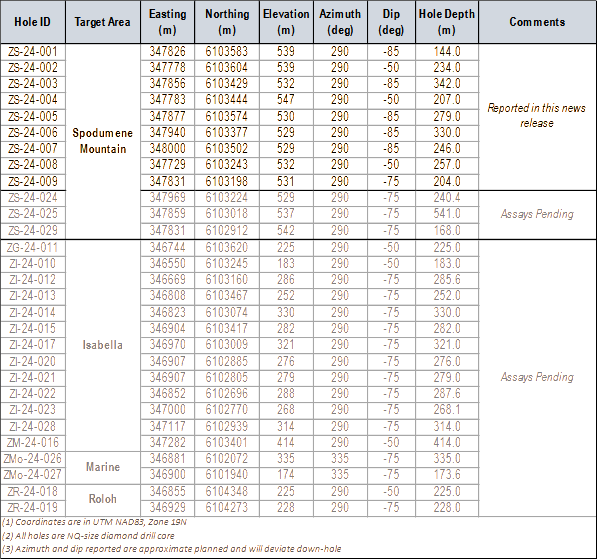
Quality assurance and quality control (QA/QC)
A Quality Assurance / Quality Control protocol following industry best practices was incorporated into the program and included systematic insertion of quartz blanks and certified reference materials into sample batches at a rate of approximately 5%.
All core samples collected were shipped to SGS Canada's laboratory in Radisson, QC, for sample preparation. The pulps were shipped by air to SGS Canada's laboratory in Burnaby, BC, where the samples were homogenized and subsequently analyzed for multi-element (including Li and Ta) using sodium peroxide fusion with ICP-AES/MS finish (codes GE_ICP91A50 and GE_IMS91A50).
Qualified Person
Patrik T. Schmidt, MSc, PGeo, Dahrouge Geological Consulting Ltd., a permit holder with the Ordre des Geologues du Quebec and qualified person as defined by NI 43-101, supervised the preparation of the technical information in this news release.
About WhiteRock Lithium
WhiteRock Lithium is a privately held critical minerals exploration and development company based out of Calgary, Alberta. The Company is focused on exploration for lithium in Canada and on rapidly advancing its flagship Sacred Banana lithium project. The Company currently holds over 100,000 hectares of highly prospective lithium exploration claims in Quebec.
Website: https://whiterocklithium.com
WhiteRock Lithium Corp
1612 17th Ave SW
Calgary, Alberta
T2T 0E3
Information/Contact
Dustin Nanos, President & CEO
1-587-577-9878
